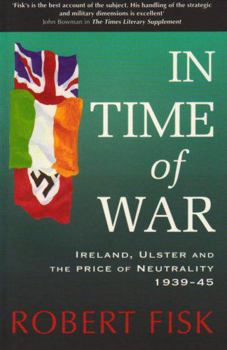In Time of War: Ireland, Ulster and the Price of Neutrality 1939-1945
Select Format
Select Condition 
Book Overview
When the Union Jack was hauled down over the Atlantic naval ports of Cobh, Berehaven and Lough Swilly in 1939, the Irish were jubilant. But in London, Churchhill brooded on the 'incomprehensible' act... This description may be from another edition of this product.
Format:Paperback
Language:English
ISBN:0717124118
ISBN13:9780717124114
Release Date:March 1996
Publisher:Gill Books
Length:672 Pages
Weight:1.60 lbs.
Customer Reviews
2 ratings
Star research, some flaws
Published by Thriftbooks.com User , 17 years ago
This is an invaluable book for anyone interested in the subject of Irish neutrality during WW II. Fisk, the great British journalist reported for the London Times from Belfast from 1972 to 1975 and has a PhD from Dublin's Trinity University so he knows something about Ireland although the book also reveals his lack of understanding of and sympathy for Catholic Ireland and, oddly, its people, who play little part in the book, probably because Fisk himself is a "little Brit" who at the time he wrote the book anyway apparently thought all moral righteousness was on the allied side (although he mentions allied firestorm civilian bombings of Dresden, Hamburg etc. only in very, very brief passing, seemingly believes all the Nuremburg atrocity stories even though many have now been discreetly discredited and dropped, and seems to think the Spanish civil war involved noble good guys who lost fighting "fascism" -- in other words he seems to have been been somewhat of a lefty). His more recent writings seem to take a more balanced and negative view of our recent warfare and its ugly details. He also seems from time to time not able to make up his mind about the interpretation of events. Example: In summing up De Valera's stubborn and successful defense of neutrality which kept Ireland's people out of the horrors of the war he calls it "the abnormal nature of the political path De Valera had chosen to follow" at one point, then shortly later in criticizing Churchill's misunderstanding of the Irish viewpoint he says, "the Irish were in the very process of regaining their soul -- their political independence -- by remaining neutral". The book is replete with this kind of thing. As an Irish fisherman watched the allied aircraft passing overhead on the way to the Normandy invasion beaches he says "The war was passing Ireland by!" Too bad for the unlucky fisherman? But this kind of thing does not detract from the essential fair reporting and massive research in this book. It will not please partisans of extreme Irish nationalism nor British imperialism and Ulster sectarianism on the other hand and supplies much interesting historical information. In his usual style Fisk speaks the truth to power and lets the chips fall where they may. My conclusion is that Eamon de Valera comes out as a greater figure than for Fisk wishes to give him credit. He kept his people out of a horrible, bloody war in which there was no nobility although Fisk seems to think God was on the British side. I think He was at Dev's side.
Well researched and readable.
Published by Thriftbooks.com User , 26 years ago
This book deals with Irish neutrality during the second world war. There are many myths attached to Irish neutrallity, stories of the IRA refeulling U-boats and threats of aggression from Britian. This book goes to the source and destroys the rumours, and holds up the facts. It also goes deeply into the political undercurrents that kept Ireland out of the second world war. Ireland held (in the first half of WWII) an extremely important strategic position. The british had abandonned three navy ports (against the advice of Winston Churchill) which would have protected the atlantic convoys against the german u-boats in 1938. Had these ports not been abandonned it is probable that the Irish could not have been neutral. The british only threatened to Invade the "Irish Free state" if they were being starved out by the U boat blockade, and would only have done this to re take the strategic ports. Interestingly the IRA were hunted down on both sides of the partition and several were hung in Dubblin during WWII. The IRA in NI were pro nazi, but there is no evidence for them helping in any significant way the Nazis. For students of Irish history this would make a very good begining point, the 1940's and WWII are not too distant in history and it looks back in enough detail to give the causes for the actions in the first half of the 1940's and sets the scene for the Irish declaration of the republic in 1947, and the subsequent absorbtion of NI into the UK in 1949. Another interesting fact is how the german bombings of Dubblin and Belfast had an enormous effect on the population there. Although light in comparison to the treatment dealt out to English cities the population of belfast was terrified into sleeping outside in the countryside. The population of Dubblin, far from being incensed at the germans bombing them, held tighter to neutrallity. Also of interest is the fact the Roseavelt wanted to invade Eire to use the strategic ports. This book destroyed alot of myths for me, and let me understand the politics of the Island alot better.





